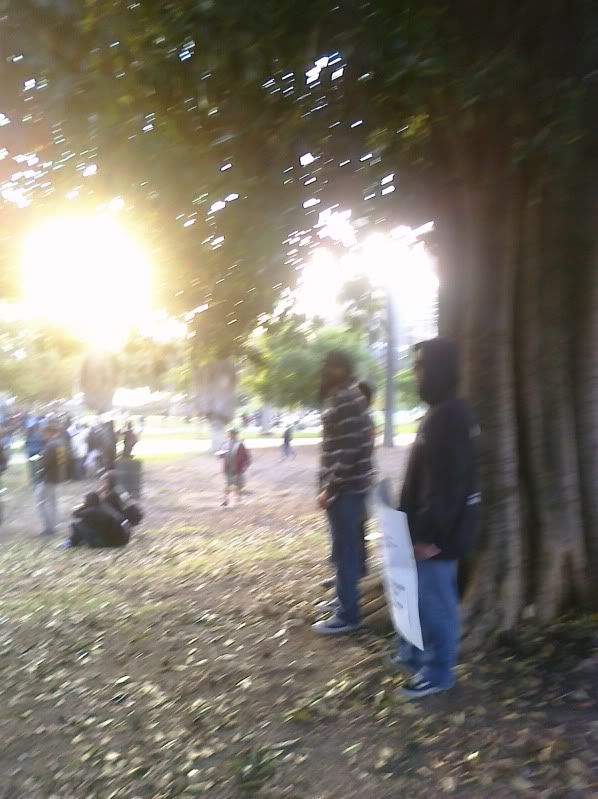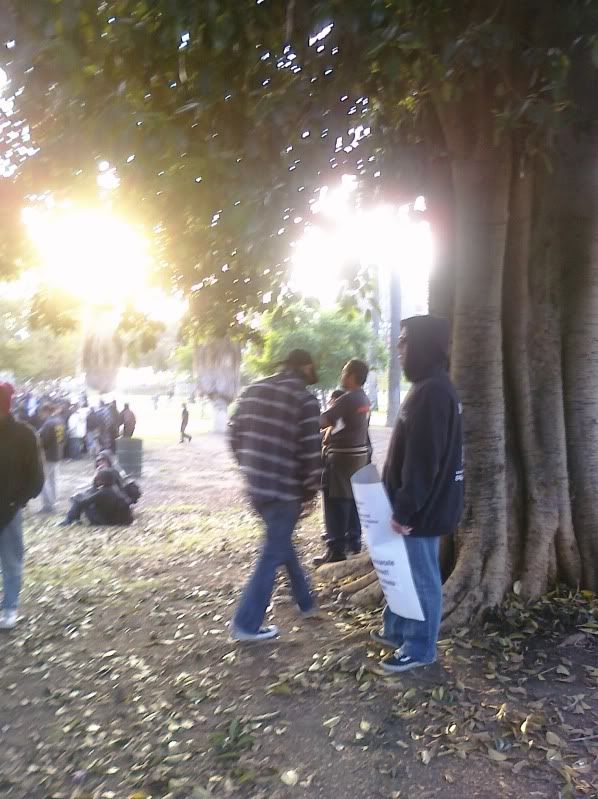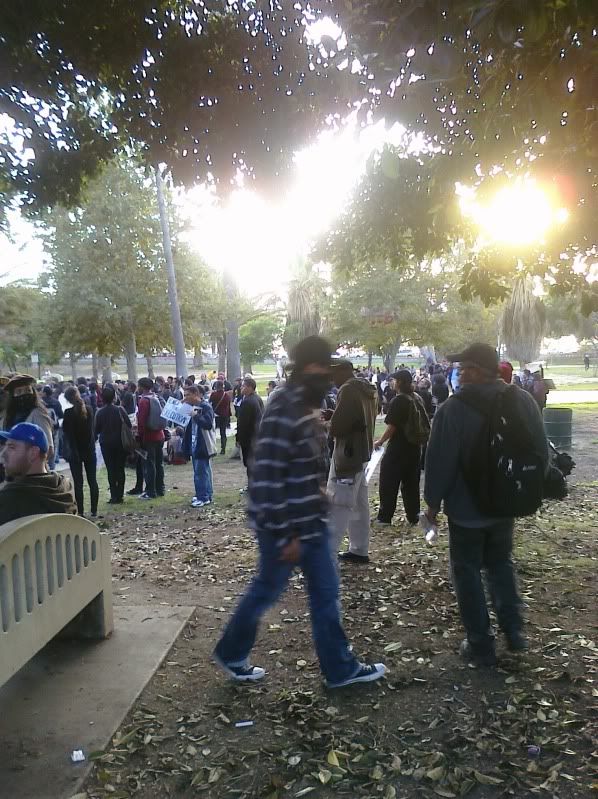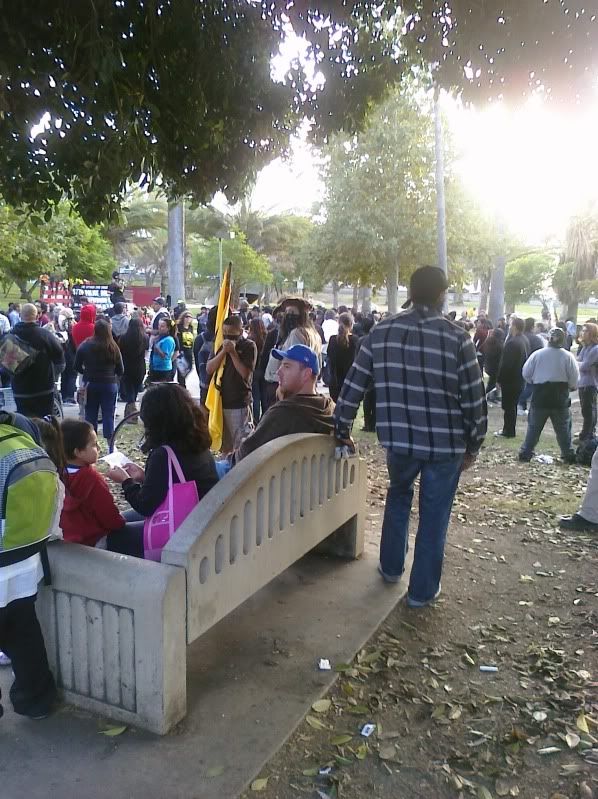Rebellions in France always remind me of one of my all time favorite films: La Haine / Hate (French)
http://stagevu.com/video/tpqiyjgvxapt
France on strike














Consternados por el artero y cobarde asesinato del compañero Indígena Catarino Torres Pereda del Comité de Defensa Ciudadana (CODECI) el día 22 de octubre a las 2pm, quienes integramos el Colectivo Autónomo Magonista hacemos llegar nuestra más sentida y sincera solidaridad para los familiares de Catarino así como a la organización hermana de CODECI.
De la misma forma nos unimos a la vos popular para exigir y luchar hasta hacer justicia a Catarino y a la organización de CODECI contra éste infame asesinato que busca silenciar mediante el asesinato a la palabra rebelde que ha florecido en casi todos los corazones del pueblo oaxaqueño.
Fraternalmente: Colectivo Autónomo Magonista
http://blogs.laweekly.com/informer/2010/10/recent_police_sweeps_do_little.php
Probation violators received some unexpected guests on Thursday after county probation officers, along with state and federal agents, descended upon multiple locations throughout Covina, Glendale, Monrovia, Pasadena and San Gabriel, leading to 35 arrests.
Three children, whose family members were probationers, were also taken into custody by the Department of Children and Family Services.
In all, the raids resulted in authorities retrieving
18 weapons and undisclosed amounts of methamphetamines and marijuana, according to the LA County Probation Department.
The raids were enormous, with 315 county probation officers and members of Immigration and Customs Enforcement, Secret Service, and parole officers joining in on the arrests at 117 locations.
While they were an incredible show of firepower, brass and testosterone, they weren't the only police gun-toting shows in town...nor the biggest.
On the same day, about 250 Los Angeles police officers, federal agents from Alcohol, Tobacco and Firearms and I.C.E. raided about 60 homes and arrested scores of gang members in an effort to stamp out Wilmington's burgeoning cocaine trade.
Also on Thursday, 800 law enforcement officials arrested 41 people in connection with a weapons, methamphetamine and cocaine ring in Long Beach, Los Angeles and La Puente.
A lot of toil and money has been spent over the years battling crime in the area. But the question remains: Are we any safer yet?
For CopWatch LA organizer Joaquin Cienfuegos and others, the answer is an emphatic "no." Such police actions "are part of a culture that terrorizes communities," he said.
Coincidentally, the crackdowns occurred a day before this afternoon's October 22nd National Day of Protest Against Police Brutality, taking place in Pershing Square until 8 pm.
While keeping guns, drugs and thugs off the streets may be a noble cause for law enforcement, some participants of the annual march say the city's young, poor and minority communities are often victimized in the process.
"The way the cops approach it isn't right," said 19-year-old Claudia Gomez, an organizer with the Youth Justice Coalition.
For one, she said sweeps pose dangers for all those involved, including neighbors and "little kids" who get caught up in the raids.
Second, people with suspected gang ties are also mistakenly rounded up during raids. Cienfuegos said that's because so-called gang affiliations often have less to do with one's connections with gangs than with having a cousin who happens to be a gang member.
"It just means you're related to somebody or know somebody" in a gang, he said.
Furthermore, with the large show of weaponry and trigger-happy officers bandying about during sweeps, raids do nothing to protect us from the very people who commit the most egregious criminal acts, namely the police themselves.
Just ask grieving Mashia Lewis, the mother of James Davis, who was shot during a confrontation with police at a South Los Angeles housing project in October, as well as family members of Manuel Jaminez, who was shot in MacArthur Park in September.
Both families attended today's protest.
Instead of escalating firepower and manpower, as is often the case in raids, Gomez thinks its time for the police to find non-violent solutions to crime.
Authorities "need to restore peace," she said. "Then the community will follow."
The families of Davis and Jaminez and others victimized by police violence would surely approve of that.





4. Help spread the word! Educate your friends and relatives about this issue.
Come to Window Rock for the next Council session!
FOR IMMEDIATE RELEASE
NEWS RELEASE
Thursday, September 30, 2010
Contact:
Ron Milford
Email: Haskan1990@yahoo.com
Phone: 928-606-0787
Navajo Nation Council Tables Water Rights Settlement
Grassroots Dine’ (Navajo) Vow to Stand Against Oppression
WINDOW ROCK, AZ – Due to pressure from the community, the Navajo Nation Council decided to put off voting on the Northeastern Arizona Indian Water Rights Settlement Agreement (NAIWRSA) and gave one week for public review but did not specify what the review would look like. The Council is set to consider the legislation again on Friday, October 8th but the date is subject to change.
Legislation No. 0422-10, also known as NAIWRSA, sponsored by Council Delegate George Arthur has faced increasing community criticism in the last few weeks.
More than 160 concerned Dine’ (Navajo) marched, rallied and then packed the council chambers to send the message for the council to “VOTE NO!” on the water rights settlement. Children, elders, parents, students and others from throughout the Navajo Nation joined together in chanting, “Water is life! Save our Future!”
NAIWRSA was created by lawyers including a non-native, Stanley Pollack, with the Navajo Nation as an attempt to resolve water rights claims of the Navajo Nation and Hopi Tribe for water from the Little Colorado River and from the lower Colorado River.
Dine’ community members have raised concerns that NAIWRSA gives the Navajo Nation only 31,000 acre-feet per year of 4th Priority Colorado River water, which would not be available in times of drought, and would require more than $500 million of new federal funding to pay for pipeline infrastructure to deliver water to communities in need. The federal funding would have to be appropriated by U.S. Congress.
One pipeline would be built to send Colorado River water from Lake Powell on the Arizona-Utah border to the reservation.
During the special session Hope Macdonald Lonetree, Council Delegate from Tuba City, raised concerns on the council floor regarding the document as being flawed & different than what was presented to the Navajo Nation committees. Specifically, exhibit A was not located in the agreement and the issue of the agreement being distributed to delegates moments before the meeting. She motioned for the agenda item to be stricken from the agenda but failed to gain votes.
Delegate Amos Johnson motioned to table the legislation and to give one week for council delegates to take the agreement back to their communities for review. 49 voted in support, 32 against with 7 not voting.
“It is appropriate for the Navajo Nation to consider Hogan level family’s water rights and they have an obligation to do that, to take it to the communities for their input which has not been the case,” stated Milton Bluehouse Sr. former Navajo Nation President. “The more informed the people are the better the decision will be made, with respect to their rights.”
Hope Macdonald Lonetree asked, "Why would we waive our rights to the water for just a promise of federal funding, when we know historically the appropriations have not come to Navajo?"
“Why was there no deliberate and detailed consultation with the affected Dine' communities?” said R Begay a concerned Dine'. “Why has this process been so secret? What does Stanley Pollack have to hide? This is an extension of colonialism and genocide against our people. We will stand against this oppression.”
“The most important thing to show our leaders is that we are watching them, we are making sure that they are accountable to their communities and what we hold sacred as Dine’ people,” stated Kim Smith, resident of St. Michaels. “Water is an essential part of our way of life, our ceremonies, our livestock and most importantly, it’s our future. We are calling on all Dine’ people who value their future, their sacred water to join us when the council goes back into session and let them know we want them to VOTE NO!”
Concerned citizens for Dine’ Water Rights along with organizations such as Dine’ Care, To’ Nizhoni Ani’, Black Mesa Water Coalition, Council Advocating an Indigenous Manifesto, ECHOES, and others are calling for another rally and march at the next council session.
The date and time have not yet been set. Visit www.dinewaterrights.org for further details.
“This movement to oppose the Arizona Water Settlement is about our children, and we will not waive their water rights, not now not ever,” Stated Ron Milford, a concerned citizen with Dine’ Water Rights.
“Only one percent of the water in this world is water we can consume,” stated Daniel Tulley a Dine’ student from Phoenix who made the trip with a caravan of ASU students to Window Rock to voice his concerns. “Worldwide water shortages are facing us, we need to protect what we have here, because it is sacred and we need to protect it for future generations.”
###
Note to editors: High Resolution Pictures Available at www.dinewaterrights.org

Jake Bacon The Aspen Nature Loop sits on a plot of ground that will be impacted by increased development of the Arizona Snowbowl. The loop is just below the lower parking area at the Arizona Snowbowl. Development maps show a new snow tubing area will be built at the site. (Jake Bacon/Arizona Daily Sun)
Arizona Snowbowl has been cleared to add a conveyor-belt-type device to carry beginning skiers uphill, and to log a new ski trail.
Coconino National Forest District Ranger Mike Elson signed off on the plans Sept. 24.
Arizona Snowbowl plans to add the 150-foot-long conveyor belt this fall and regrade a 1.5-acre area due north of its lower lodge with bulldozers to create a flatter teaching area.
The owners plan to use the conveyor belt to save beginning skiers a walk uphill during lessons. They also plan to widen a lift line at the Spur Catwalk.
Whether logging is feasible this year is less certain, given the late start to the project and the onset of winter weather in two months or less.
Despite the imminent start of construction, Snowbowl's owners remain in court with a second lawsuit. They are fighting a handful of local plaintiffs who assert that using reclaimed water to make snow might not be safe for skiers or the environment.
As part of that case, both sides have agreed that no snowmaking-related construction would begin until after a ruling in federal district court in Phoenix. That is expected to happen in late October, said attorney for the plaintiffs Howard Shanker.
Shanker has vowed to appeal any decision not in his favor to the 9th U.S. Circuit Court of Appeals.
Eric Borowsky, a Snowbowl part-owner, said that if he wins at the district court level this fall, he would start construction as soon as possible in order to make artificial snow in the winter of 2011-12.
"We're hopeful that the judge will rule in our favor," Borowsky said. "And if she does, we'll probably start construction. If it happens to be a dry winter, we would start construction on the (water) pipeline from Highway 180 back to Thorpe Park almost immediately."
Borowsky's attorneys are seeking to have the case thrown out on the grounds that some of the plaintiffs are obstructing any possible resolution by opposing either reclaimed or drinking water to make snow -- a position some of them openly acknowledged at the outset.
The plaintiffs suing the U.S. Forest Service since 2009 in this lawsuit are the Save the Peaks Coalition, Kristin Huisinga, Clayson Benally, Sylvan Grey, Don Fanning, Jeneda Benally, Frederica Hall, Berta Benally, Rachel Tso and Lisa Tso.
Tribes suing the federal government to prevent snowmaking lost their argument that allowing more development would infringe on their religious freedoms in June 2009, when the U.S. Supreme Court declined to hear their case, leaving in place a 9th Circuit ruling that allowed snowmaking.
Cyndy Cole can be reached at 913-8607 or at ccole@azdailysun.com.
Posted in Local on Friday, October 1, 2010 5:10 am Updated: 11:25 pm. | Tags: